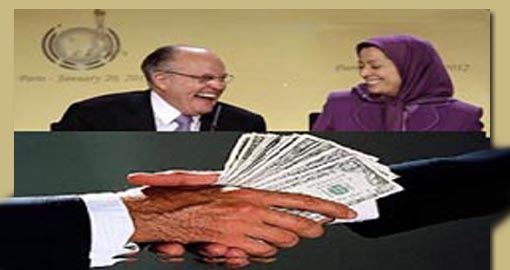Rudy Giuliani belongs in prison
IF CLINTON BELONGS IN PRISON, SO DOES GIULIANI
Rudy Giuliani speaks before Republican U.S. presidential nominee Donald Trump at a rally in Cincinnati on October 13. Jacob Sullum writes that there is a strong case to be made that the former New York City mayor, who reportedly is in the running for secretary of state in the Trump administration, committed multiple federal felonies by assisting Mujahedeen-e-Khalq (MEK), an Iranian opposition group that the State Department listed as a terrorist organization until September 2012.
MIKE SEGAR/REUTERS
During the presidential campaign, Rudy Giuliani argued (correctly) that Hillary Clinton could be charged with a  federal felony for mishandling classified information through her sloppy email practices as secretary of state even if she did not intend to break the law.
federal felony for mishandling classified information through her sloppy email practices as secretary of state even if she did not intend to break the law.
But there is also a strong case to be made that the former New York City mayor, who reportedly is in the running for secretary of state in the Trump administration, committed multiple federal felonies by assisting Mujahedeen-e-Khalq (MEK), an Iranian opposition group that the State Department listed as a terrorist organization until September 2012.
“My ties to them are very open,” Giuliani, a former U.S. attorney, recently told The New York Times. “We worked very hard to get them delisted.” But under the broad understanding of the federal ban on “material assistance” to terrorist groups that the Supreme Court upheld in 2010, that work was pretty clearly a crime punishable by up to 15 years in prison.
The “material support” statute, 18 USC 2339B, prohibits the provision of “training,” defined as “instruction or teaching designed to impart a specific skill”; “expert advice or assistance,” defined as “advice or assistance derived from scientific, technical or other specialized knowledge”; “personnel,” which means any person, including oneself, who works under the organization’s “direction or control”; or any other “service,” which is not defined at all. In Holder v. Humanitarian Law Project, the Supreme Court said the law covers volunteer work aimed at helping listed organizations resolve their grievances through nonviolent means.
While such advice and advocacy would ordinarily be protected by the First Amendment, the court said, “the government’s interest in combating terrorism” justifies the speech restrictions imposed by the ban on material support.
Notably, the Supreme Court refused to read the law as requiring an intent to further a terrorist organization’s illegal activities. As long as someone knows he is assisting a “foreign terrorist organization” (FTO), it is no defense to say he only meant to promote its lawful activities. Giuliani, who “worked very hard to get [the MEK] delisted,” obviously knew the group was considered an FTO.
Nor is it necessary that someone providing material support to an FTO receive compensation in return, although Giuliani apparently was paid handsomely for his speeches on behalf of the MEK. According to the court, the difference between protected and prohibited advocacy is not whether money changes hands; it’s whether the advocacy is “performed in coordination with, or at the direction of, a foreign terrorist organization.” By announcing that “my ties to [the MEK] are very open,” then, Giuliani is effectively confessing to a crime.
I am not saying Giuliani should go to prison for his efforts to rehabilitate the MEK. The State Department’s list is arbitrary and shaped by political considerations, the MEK had a strong argument that it should no longer be considered an FTO, and in any case peaceful advocacy of lawful activities should never be treated as a crime. Knowingly providing material assistance to an FTO (which Giuliani did) is not necessarily the same as knowingly providing material assistance to terrorism. For the sake of fairness and freedom of speech, the law’s mens rea requirement should be stronger.
The same goes for 18 USC 793, which Clinton arguably broke by allowing classified information to be removed “from its proper place of custody” through “gross negligence,” a felony punishable by up to 10 years in prison. A conviction under that law should require more than negligence, because it should not be possible to accidentally commit a crime. That is the main reason James Comey gave for declining to recommend charges against Clinton: Although the law does not require criminal intent, justice does.
But Giuliani was not willing to cut Clinton any such slack. As far as he was concerned, she violated the letter of the law, so she should have been prosecuted. It did not matter whether she realized she was breaking the law.
By that same reasoning, Giuliani should be prosecuted for providing material support to a foreign terrorist organization. It does that matter that he did not view the MEK as a terrorist group; it’s enough that the State Department did. Nor does it matter that he did not intend to promote terrorism, since the law does not include any such mens rea requirement.
If Hillary Clinton belongs in prison, so does Rudy Giuliani.
Jacob Sullum, Newsweek,
Jacob Sullum is a senior editor at Reason magazine and a nationally syndicated columnist.

